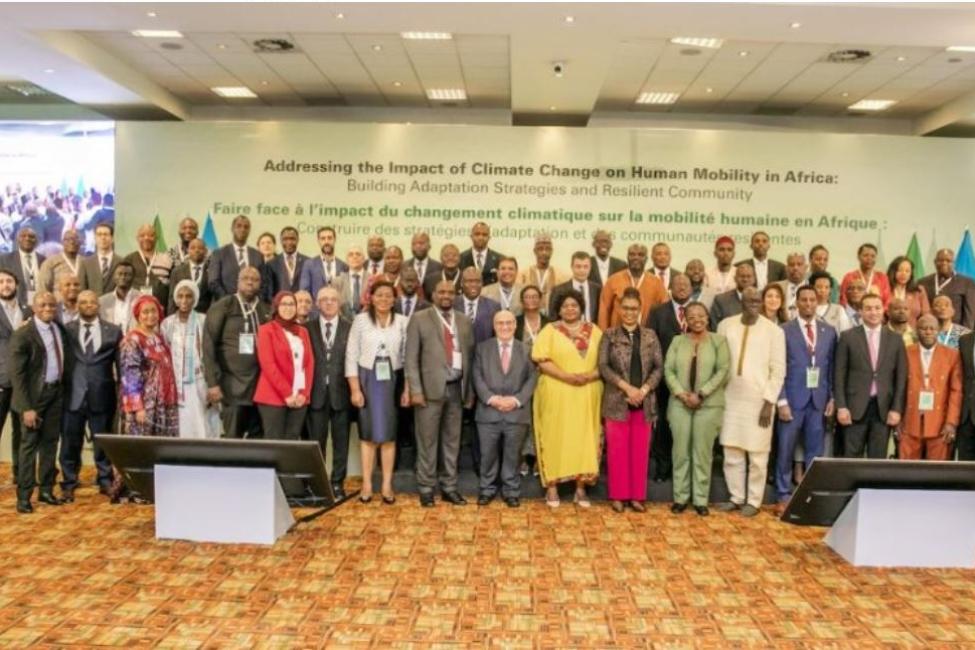-
Who we are
WHO WE AREThe International Organization for Migration (IOM) is part of the United Nations System as the leading inter-governmental organization promoting since 1951 humane and orderly migration for the benefit of all, with 175 member states and a presence in 171 countries.
-
Our Work
Our WorkAs the leading inter-governmental organization promoting since 1951 humane and orderly migration, IOM plays a key role to support the achievement of the 2030 Agenda through different areas of intervention that connect both humanitarian assistance and sustainable development.
What We Do
What We Do
Partnerships
Partnerships
Highlights
Highlights
- Where we work
-
Take Action
Take Action
Work with us
Work with us
Get involved
Get involved
- Data and Research
- 2030 Agenda
Inclusive Climate Action Needed to Address Impacts on Human Mobility: IOM DG
Kigali – International Organization for Migration (IOM) Director General António Vitorino told the seventh Pan-African Forum on Migration (PAFOM) in Rwanda last week that unified, multi-stakeholder action is required to address the challenges climate change poses to human mobility in Africa.
“This conference in Kigali provides us with a platform to call for first; increased climate change adaptation action, measures, and resources; second, strengthened support to countries and people most vulnerable to the impacts of climate change, including addressing Loss and Damage and, third, more inclusive climate action, mobilizing all stakeholders, from Governments, to civil society, including public and private finance,” said Mr Vitorino.
PAFOM brought together representatives of 39 African Member States, the African Union Commission (AUC), and other partners for four days to focus on the impact of climate change on human mobility on the continent.
International fora such as the Climate Change Conferences of the Parties (COPs) have the potential to strengthen the momentum for action which has taken root across this continent, and further mobilizes resources and capacities to proliferate that action, DG Vitorino said.
A renewed sense of urgency must be brought to COP27, the “Africa COP” in Sharm el Sheikh, Egypt, he added.
Ministers for Environment, Migration, Foreign Affairs and International Cooperation of AU Member States, released a Communiqué that proposes responses and actions to avert, minimize and address displacement linked to climate change, including ways to facilitate safe, orderly and regular migration pathways through more adaptation, loss and damage measures, and other policies.
Senior officials from government, the African Union Commission (AUC), Regional Economic Communities (RECs), cities, academia and international organizations had deliberated on the impact of climate-induced mobility and the role that climate change has on displacement, including exchanging knowledge to inform policymaking.
Aissata Kane, Senior Regional Advisor for Sub-Saharan Africa explained IOM’s role in the forum and highlighted that climate change and environmental factors have long had an impact on global migration flows, as people have historically left places with harsh or deteriorating conditions.
Director of the IOM’s Special Liaison Office to the AU and UNECA in Addis Ababa, Ethiopia, Cisse Mariama Mohamed said PAFOM is one of the key highlights of IOM’s collaboration with the AUC, and that this year’s forum served as an opportune time to meet with Member States to discuss climate change-induced migration ahead of COP27.
PAFOM is an African interregional forum and consultative process for migration and human mobility for Africa established in 2015, and meets annually under a chosen migration theme, with a Minister’s meeting every two years.
***
For more information contact: Eric Mazango, emazango@iom.int


